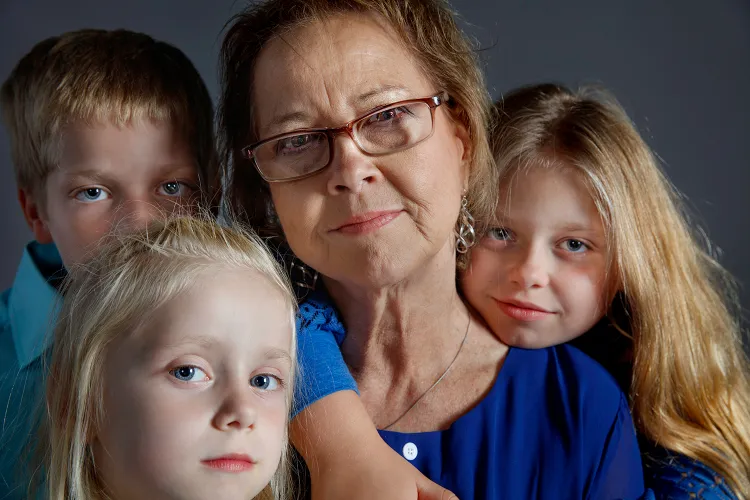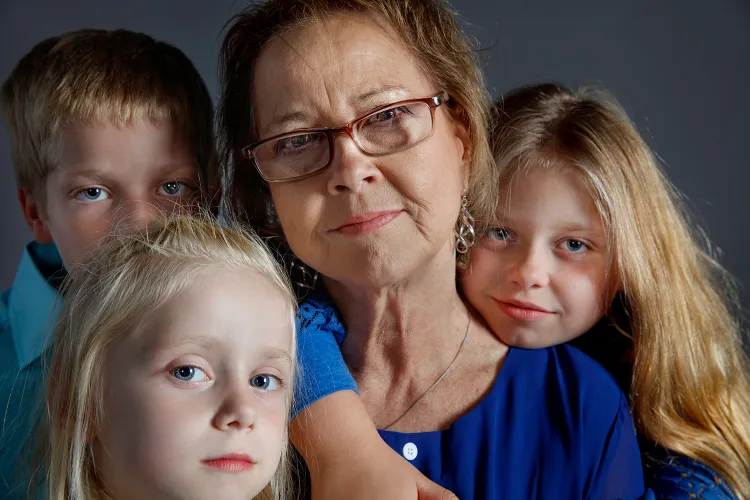Nurse MaryBeth Lewis, 68, Gave Birth to Her 13th Child at Age 62 — Now Charged in Surrogacy Fraud and Fighting for Custody of Her 14th and 15th Children
MaryBeth Lewis has spent much of her adult life building a family larger than most people could imagine. For decades, she approached motherhood with determination, faith and a sense of purpose that surprised even those closest to her. Now, at 68 years old, the New York nurse who once drew national attention for giving birth at age 62 is in the middle of a complicated and emotionally charged legal battle. After having 13 children through various means — including IVF, donor embryos and late-in-life pregnancy — she now faces criminal charges and a fierce custody fight for what she hoped would be her 14th and 15th children.

The case has grown far beyond a family dispute, reaching into the worlds of reproductive ethics, surrogacy law, elder motherhood and questions about the welfare of newborn children. The story began as one of extraordinary, unconventional motherhood, but it now stands at the center of a legal storm that few could have predicted.
MaryBeth and her husband, Bob Lewis, a retired FedEx pilot, became known over the years for their unusually large family and for their use of modern fertility technologies long before they became mainstream. They welcomed their eighth child in 2010, and in 2014, MaryBeth delivered her twelfth child at age 53. But what drew national attention was her final pregnancy: at age 62, she gave birth to her thirteenth child, a moment that sparked equal parts admiration, disbelief and debate across the country.
But motherhood did not end there for MaryBeth. In 2023, she made the decision to pursue surrogacy, using a donor embryo to bring twins into the world. For a woman in her 60s, the surrogacy process was the safest path forward, and according to MaryBeth, the plan seemed simple: a surrogate would carry the babies, and once the twins were born, MaryBeth and Bob would welcome them into their large, bustling home.
Instead, the surrogacy arrangement led to a sweeping criminal case.
Authorities allege that MaryBeth engaged in a series of fraudulent actions in her attempt to secure parental rights over the newborn twins. According to prosecutors in Steuben County, New York, she forged her husband’s signature on key legal documents, misrepresented her role to medical providers and even impersonated him during a virtual court hearing. These accusations led to more than two dozen charges, including forgery, identity theft and attempted kidnapping. The allegations stunned even longtime observers of the case because they struck at the very foundations of a process that relies heavily on legal transparency.
The twins were born in 2023, and under normal circumstances, MaryBeth and Bob would have taken custody immediately. Instead, authorities intervened, and the infants were placed with foster parents. A judge later ruled that MaryBeth and Bob were indeed the legal parents of the twins, but before the ruling could be carried out, the foster family filed an appeal. Today, the custody of the twins remains unresolved as the case moves through courts that must weigh the legal complexities against the welfare of the two infants caught in the middle.
MaryBeth, for her part, maintains that while mistakes may have been made, her intentions were always rooted in love and motherhood. In interviews, she has expressed heartbreak that the twins she dreamed of bringing home remain with foster parents. She has described the situation as a tragic misunderstanding — one that spiraled into something far larger than she anticipated.
But investigators see it differently. Prosecutors argue that the seriousness of the alleged fraud could have compromised the safety of the children and the integrity of the surrogacy process. They maintain that proper protocols exist to protect all parties — the surrogate, the intended parents and, most importantly, the newborns. Any attempt to bypass those safeguards, they argue, must be met with strict accountability.
Medical experts have also weighed in on the broader questions raised by the case. While reproductive technology has advanced rapidly in recent decades, pregnancy and parenthood at advanced ages still raise concerns. MaryBeth’s ability to give birth at age 62 was medically rare, though not unprecedented. But many specialists argue that motherhood in one’s 60s requires intense support, resources and health stability — raising complex questions about long-term caregiving for young children. With the addition of surrogacy and a growing family structure, these questions only multiply.
Neighbors, family friends and even those who have followed the case from afar are divided. Some see MaryBeth as a dedicated mother whose love for children knows no bounds. To them, the charges feel like an overly harsh response to a complicated situation involving paperwork, misunderstandings and a passionate desire for family.
Others believe the case highlights the need for stricter oversight in reproductive technology and surrogacy agreements. They argue that the courts must prioritize the safety and well-being of the twins, not the ambitions of parents — however heartfelt those ambitions may be.
The foster parents caring for the twins have insisted that they are acting in the babies’ best interests, filing appeals to prevent what they believe could be an unstable legal transition. As the appeals continue, the infants remain with them, living in a home separate from the large Lewis family that would have welcomed them into a sibling group of more than a dozen children.
For MaryBeth, who spent decades building her family and embracing motherhood as her life’s calling, being separated from the twins is a profound emotional blow. Her earlier children range from young adults to teenagers, creating a family dynamic that has always been anything but ordinary. To her, motherhood has always been her identity, and the surrogacy was meant to continue that journey. Now, instead of a celebration, the family faces hearings, court filings and criminal indictments.
As the case moves forward, legal experts say it may become a precedent-setting example in discussions about surrogacy fraud, elder motherhood and reproductive ethics. The courts will eventually determine whether MaryBeth and Bob are fit to take custody of the twins and whether MaryBeth is guilty of the many charges against her. But the emotional weight of the case — the heartbreak of a mother separated from children she believes are hers — will linger long after the legal dust settles.
What makes the story even more complex is the presence of 13 older siblings whose lives are also affected by the events. The Lewis children, raised in a uniquely large and tightly woven family, now watch from the sidelines as their parents navigate accusations that challenge the foundation of their home. To them, the twins are not case files or legal arguments — they are siblings they hope to meet, love and grow up beside.
For now, the infants remain in foster care. The legal battle continues. And the future of MaryBeth’s family — once defined by unity, resilience and a love of children — now hangs on the decisions of judges, lawyers and court proceedings that will unfold in the months ahead.
Whatever the outcome, the story of MaryBeth Lewis has become much more than a headline about motherhood at an advanced age. It is now a complex tapestry of ambition, legality, ethics and emotion — a reminder that behind every family, especially those that defy convention, are challenges that can be as vast as the dreams that created them.



